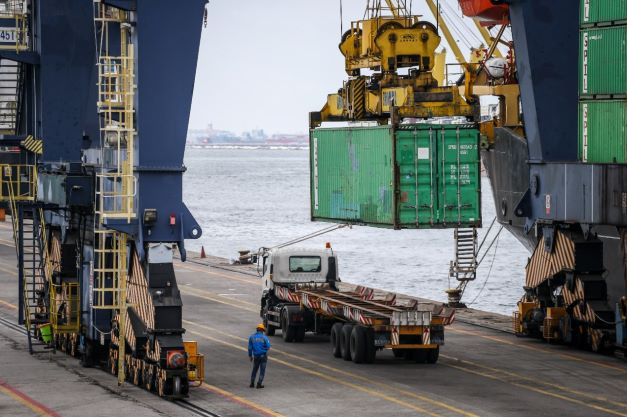Popular Reads
Top Results
Can't find what you're looking for?
View all search resultsPopular Reads
Top Results
Can't find what you're looking for?
View all search resultsIn people’s power we trust
Indonesia’s exports have finally succumbed to the global economic doldrums that weakened demand from major markets.
Change text size
Gift Premium Articles
to Anyone
“The ultimate resource in economic development is people. It is people, not capital or raw materials that develop an economy,” the renowned management guru Peter Drucker once said. His wisdom could not be more relevant to the current reality of the Indonesian economy.
The country’s engines of growth have been relying heavily on domestic consumption, investment and exports. Per the second quarter of this year, the three components helped Indonesia’s gross domestic product (GDP) grow 5.44 percent year-on-year (yoy).
Consumer spending grew 5.51 yoy and investment rose 3.07 percent yoy. Exports, meanwhile, soared most dramatically at 19.74 percent yoy, backed by robust demand from key trading partners.
Unsurprisingly the government was confident exports could still maintain their momentum as the biggest catalyst to support the economic growth, despite realizing that some impending challenges — such as global economic woes and the end of the “commodity windfall” — could easily jeopardize the future of non-oil and gas exports.
To maintain such splendid export growth, the government also relentlessly injected various stimuluses in a bid to avert the repercussions of declining commodity prices, particularly toward shipments of crude palm oil (CPO) and its derivatives, as well as coal.
The stimulus included extension of the “zero levy” measure on CPO exports, hoping that this primary commodity could still be shipped en masse amid risks of sluggish global demand and skidding prices.
The strategy worked though. In August, CPO export volume and value hit record highs of 3.6 million tonnes and US$3.7 billion, respectively.
However, the windfall did not last long. The latest Statistics Indonesia (BPS) data, released on Monday, discovered sluggish demand from key trading partners began to take a toll on exports of “backbone” commodities, especially CPO and coal, in September.
Exports slumped by 10.99 percent month-to-month (mtm) to $24.8 billion, while imports fell by 10.58 percent mtm. Consequently, the trade surplus sank by 13 percent mtm to just $4.99 billion, albeit still maintaining its position in the positive zone for 29 consecutive months since May 2020.
In other words, Indonesia’s exports finally succumbed to the global economic doldrums that weakened demand from major markets.
With a global recession around the corner, perhaps, it is also time to learn to bid farewell to the “commodity honeymoon”. Commodity exports can no longer drive economic growth regardless of the generous incentives the government can offer to boost sales.
From the beginning, experts have warned the government against relying on commodities, which they regard as unsustainable because prices will eventually tumble, posing a threat to the trade balance and overall economic growth.
Eventually, Indonesia has to count on consumer spending at home as the main engine for growth. All stimuluses should be directed to spur local demand, especially for locally manufactured goods instead of imported ones.
As Drucker put it a long time ago, the real power in economic development is the people. Hence, improving people’s purchasing power is crucial for Indonesia, as exports – and investment – will remain lackluster for an indefinite period.
The previous crises showed the country could survive thanks to the power of its people. This time around they will come to the rescue, fingers crossed.











